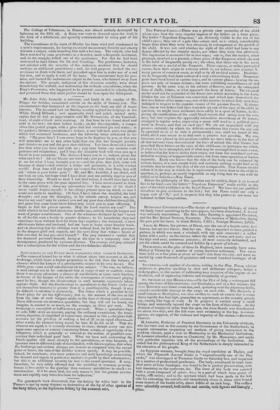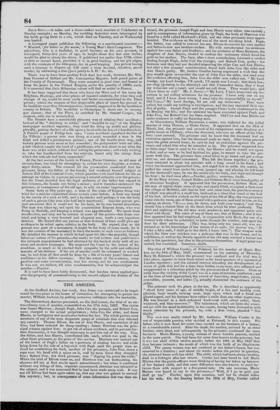METHODIST CONFERENCE.—The design of appointing Bishops, of which we lately
heard something in the newspapers, has been abandoned, if it ever was seriously entertained. The Rev. Jabez Bunting is appointed President, and the Rev. Robert Newton, Secretary. The increase of Methodists during the past year has been, in Great Britain, 7,955; Foreign Missions, 2,025.
Lucas de Heere, the painter, of Ghent, was the son of a female artist, less known, but not less clever, than her son. She is reported to have painted a picture, in which was seen a windmill, with the sails extended ; a miller laden with a sack ; on the terrace before the mill, a horse and cart; and on the high road near, numerous peasants ; all most correctly delineated, and yet the whole could be covered and hidden by a grain of wheat.
Horse-races, on the plan of those in England, have recently been established at Vienna by a number of young Austrian noblemen. The races were held on a fine plain at about an hour's ride from the city, and were attended by some thousands of spectators and several hundred carriages of all sorts.
STUTTERING.—A teacher of elocution, writing in the New Tizzies, advises stutterers to practise speaking in slow and deliberate whispers, before a looking-glass, as the means ofcultivating easy exercise of tine organs of articulation, and of repressing violence and irregularity of gesture.
ST. SWITHIN IN TIM HIOHLAN05.-011 tile 21st of July, a waterspout fell among the braes of Glenmorristou and Strathglass, and in a few minutes the river Alorriston rose about seven feet, and, spreading over the adjoining fields, caused considerable damage to the crops on each side. The Deavoch, small stream in Strathglass, was also swollen to such art extent that it came down rapidly rive feet high, presenting an appearance, as the country people say, exactly like bags of wool. In its progress it carried away a small bridge, and materially injured the crops on the farm of Guisachatt. At the distance of twenty-six miles from the spot, the river Beauly was discoloured for above two days, and the fish were seen swimming at the top, in consequence, we suppose, of the violence and impurity of the stream.—Iiiverness Courier.
M. Lemaine, Professor of Practical Geometry in the University of Ghent, who has been sent to this country by the Government of the Netherlands; to acquire information respecting our methods of giving instruction to the working classes, paid a visit on Wednesday to the Mechanics' Institution. M. Lemaine attended a lecture on Chemistry, by Mr. Hemmings, and made very particular inquiries into all the proceedings of the Institution. He stated that the philosophical King of the Netherlands is deeply interested in • the education of his people.
An Egyptian mummy, brought from the royal sepulchre at Thebes, and which the Plymouth Journal thinks is "unquestionably one of the Pharaohs," was unwrapped at Trematon Castle on Saturday last, and inspected by a number of professional gentlemen. The body, enveloped in some hundred yards of linen bandages, was found to be in perfect preservation, with hair remaining on the eyebrows, 3cc. The front of the body was covered with a paste composed of spices, &c.; in a part of which were grains of barley, still entire; and in the aperture which had been made in the left side for extracting the entrails, and immediately above it, there were found some insects of the beetle tribe, about 3-8ths of an inch long. The coffins were splendidly covered, both inside and ontside, with figures and hierogly phics. Pinta DAYS.-A tailor and a dress-maker were married at Colchester on Sunday sennight ; on Monday, the wedding festivities were interrupted by the bride giving birth to a son, which died on Tuesday, and on Wednesday was buried.
A Liverpool paper publishes the following as a matrimonial overture:— 6' Wanted, rfor better or for worse,' a Young Man's Best Companion. The advertiser, who is a bachelor, in good business on his own account, in Liverpool, thirty-five years of age, in height about five feet nine inches, would be glad to obtain the above, if published not earlier than 1790, either at first or second hand, provided it is in good binding, and has gilt edges, with the contents of the title-page, &c. in good keeping. Any person having such a treasure to dispose of, will meet a most devoted, attentive, secret reader, by addressing a line (post paid) to S. H." &c. &c.
There was to have been another Irish duel last week, between Mr. William Tennant of Belfast and Mr. Constantine Maguire, both grand jurors of the County of Fermanagh. They were arrested in good time, arid bound to keep the peace in the United Empire, under the penalty of 5000/. each. It is rumored that their Hibernian valour will find an outlet in France.
It has been suggested that those who leave the West end of the town for Brighton, Hastings, and other places of reputed salubrity, for what they call change of air' would be more easily and better accommodated in the Fleet prison; which the surgeon of that respectable place of resort has proved to be healthier even than Glamorganshire, formerly supposed to Be the healthiest county in Britain. The mortality in Glamorgan is about one in seventy per annum ; that of the Fleet, as certified by Mr. Samuel Cooper, the surgeon, only one in seventy-five.
The French have a remarkably pleasant way of relating their accidents : instead of the "shocking to relate," and "dreadful to say," of the English newspaper accident reporters, they wind the thing up neatly and philosophically, putting the loss of a life upon a level with the loss of a handkerchief. A French paper of Friday last, says, "some accidents signalized the fate of La Villette : a person who was firing at a mark wounded a man in the thigh and killed a journeyman printer; one of the booths gave way, and twenty persons were more or less wounded ; the pickpockets were riot idle; a law strident caught the hand of a gentleman, who was about to see what the hour was at his watch, without first asking his permission ; and a lady wishing to take her handkerchief front her reticule, found only the strings from which the reticule had been suspended."
At the last assizes of the Loiret in France, Pierre Crosnier, an old man of seventy-four, was tried for attempting to violate his own daughter, a widow, aged thirty-seven. The counsel for the prosecution contended that the prisoner, being the father of the female, had rendered himself subject to Article 333 of the Criminal Code, which punishes with hard labour for life an attempt to violate, by a person possessing a natural authority over the person ; but tile Court decided that the legal authority of the father had ceased in this instance, the female not being a minor ; and it therefore sentenced the prisoner, in consequence of his old age, to only six years' imprisonment.
Some forty or fifty years ago, a man of the name of Eugene Aram was tried for a murder committed above twenty years before. A body was found in the cavity of a rock or hill, and a bystander said perhaps it was the body of such a person (the man who had been murdered). Another person present answered that it could not be his body, for he was buried elsewhere.
The man was taken up, and upon his examination Eugene Aram, who was living in Norfolk, and keeping a school, was apprehended. We speak from
recollection, and may not be correct in some of the points—but Aram was tried, and being a very learned and eloquent man, made a very ingenious defence. He denied that any person at that distance of time could give any evidence to be relied upon, relative to the body. He argued, that as the ground was part of a monastery, it might be the body of some monk, for it was the custom of the monastery to bury the monks in such caves or hollows. He detailed the manner in which he had spent his life—the peaceful, though laborious nature of his pursuits—the works he had written and published— the intimate acquaintance he had obtained by the hardest study with all an cient and modern languages. He surprised the Court by the extent of his erudition, as much as he excited their sympathy by the mild and collected mariner of his defence. If the sin of murder could be redeemed or washed out, he had done all that could be done by a life of twenty years' labour and usefulness to his fellow creatures. But the nature of tte evidence, some positive and some circumstantial, was too strong, and he was condemned. It was not, we believe, till after condemnation, that he acknowledged the murder.—Courier.
It is said to have been lately discovered, that leeches twice applied possess the property of communicating to the second subject the disease of the first.



















 Previous page
Previous page